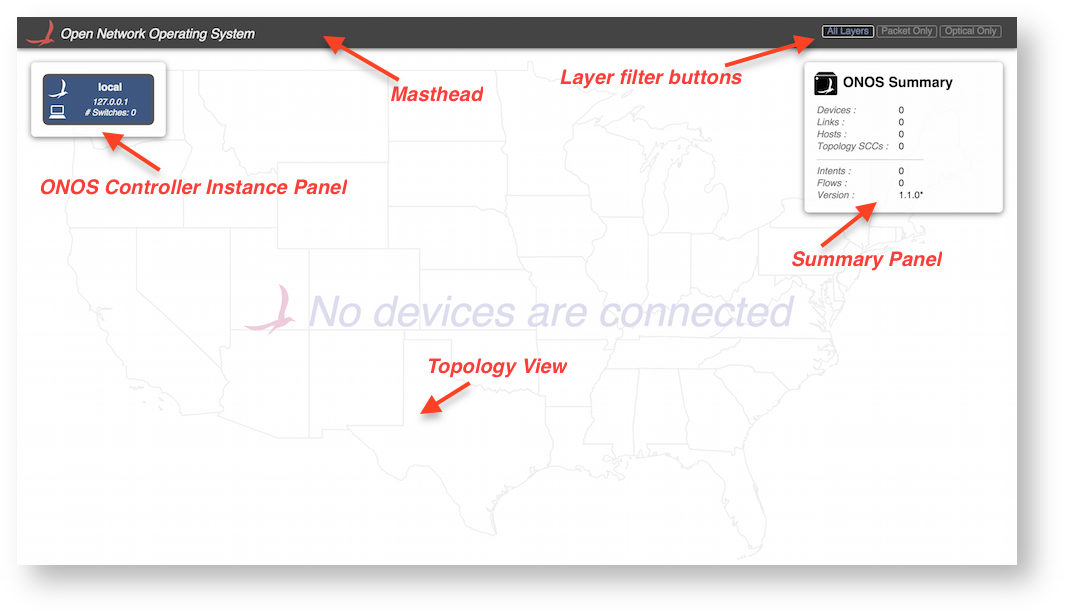GUI Overview
The ONOS GUI is a single-page web-application, providing a visual interface to the ONOS controller (or cluster of controllers).
For documentation on how applications running on ONOS can inject content to the GUI at runtime, see (TBD).
For documentation on the design of the GUI, see the GUI Architecture page.
GUI Configuration Notes
- The onos-gui feature must be installed in ONOS.
- The GUI listens on port 8181.
- The base URL is /onos/ui; for example, to access the GUI on localhost, use: http://localhost:8181/onos/ui
- The GUI has been developed to work on Google Chrome. Other browsers may work, but have not been extensively tested, and are not actively supported, at this time.
GUI Session Notes
Note that the current version of the GUI does not support the concept of users, nor require login credentials. These enhancements will be added in a later release.
On launching the GUI you should see a screen that looks something like this:
The dark gray bar at the top is the Masthead, which provides a location for general GUI controls. In the current version (1.1.0 "Blackbird") this is where the "topology layer filter" radio buttons are placed. (In future versions, this will be where session controls – user ID, user preferences, logout etc. -- will be located.)
The remainder of the screen is the "view" – in this case the "Topology View" which gives a cluster-wide view of the network topology.
The ONOS Controller Instance Panel indicates the controllers in the cluster.
The ONOS Summary Panel gives a brief summary of properties of the network topology.
GUI Navigation
Navigating from one view to another is done by opening the navigation pane and clicking on a link ("nav item"). As of the current release (1.1.0 "Blackbird") this feature is still under development.
GUI Views
The GUI is capable of supporting multiple views and as new views are added to the base release, they will be documented here.
NOTE: The capability of adding views to the GUI dynamically at run-time is being developed. This will allow, for example, an ONOS App developer to create GUI content that works specifically with his application. The content will be dynamically injected into the GUI when the app is installed, and automatically removed from the GUI when the app is uninstalled. For more details on this feature, see (TBD).
Topology View
The Topology View provides an interactive visualization of the network topology, including an indication of which devices (switches) are mastered by each ONOS controller instance.
Device View*
The Device View provides a top level listing of the devices in the network.
Link View*
The GUI Link View provides a top level listing of all the links in the network.
Host View*
The Host View provides a top level listing of all the hosts in the network.
Intent View*
The Intent View provides a top level listing of all the intents in the network.
Application View*
The Application View provides a top level listing of and allows interaction with all the applications on the network.
Cluster Node View*
The Cluster Node View provides a top level listing of all the cluster nodes, or instances, in the network.
*Tabular View: The GUI has multiple "tabular views" that are similar in look and interaction, but display different information. For a general overview of tabular usage, see the Tabular View page. For specifics on each view, see above.
Release Notes
This section provides a reverse-chronological listing of changes to the GUI for each release.
Blackbird – 1.1.0
- GUI Framework migrated to use AngularJS.
- View-agnostic features refactored as Angular Services.
- Topology View refactored to be an Angular module.
- Topology source code broken out into multiple source files.
- Port Highlighting on links added.
- Device View added.
- Implemented as a simple table for now; one device per row, sortable by column header clicks.
- Sample View added.
- Skeletal example code.
- Light and Dark themes fully implemented.
- Press the 'T' key to toggle theme.
- Beginnings of UIExtension mechanism implemented
- Over future releases, this will facilitate the ability of Apps to inject their own content into the GUI.
- Over future releases, this will facilitate the ability of Apps to inject their own content into the GUI.
- Note that the new (Angular-based) GUI currently co-exists with the old (Avocet) GUI.
- By default, the Avocet GUI is launched; the base URL http://localhost:8181/onos/ui is mapped to http://localhost:8181/onos/ui/legacy/index.html#topo.
- The new Angular-based GUI can be launched by manually adjusting the URL to be: http://localhost:8181/onos/ui/index.html#topo, (that is, remove "legacy/").
Avocet – 1.0.0
- GUI implemented using a home-grown framework.
- Single view (Topology View) implemented, displaying network topology and providing a certain level of interaction to show traffic & flow information.
- Although the 'T' key-binding (toggle theme) is present, the "dark" theme has not been implemented.
Previous : The ONOS CLI
Next : Distributed ONOS
